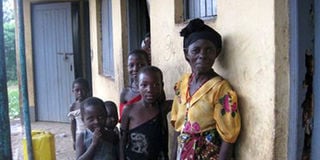Mpondwe struggles to recover after insurgency

RESIDENTS: A woman and her children in Mpondwe Town. COURTESY PHOTO
Mr Elijah Masereka’s family lives in Kambukamabwe Village, Kamasasa Parish in Mpondwe-Lhubiriha Town Council. It is one of those families that suffered but survived the brutal attacks by the Allied Democratic Forces (ADF) rebels when they launched a bloody war, some 13 years ago.
During the attack, his shop was burnt down. Mr Masereka, 67, a peasant farmer, has appealed to the government to compensate his property but in vain.
Last year, he met the Defence Minister, Dr Chrispus Kiyonga, over the same issue and he was advised to utilise the government’s National Agricultural Advisory Services programme.
However, Mr Masereka is not walking a tight rope alone; what he is experiencing started on November 13, 1996, when residents of Bwera Town and Mpondwe-Lhubiriha in Kasese District at the Uganda-Democratic Republic of Congo border, fled their homes following an attack on the towns by ADF rebels.
Bwera Town and Mpondwe border post were seized by the rebels but were recaptured by the UPDF the following week. Some 25,000 people fled their homes and sought refuge in Kasese Town and Bushenyi .
This prompted President Museveni to visit the border area soon after security had been restored. As relative peace returned to the area, residents began to go back to their homes on hearing reports that their homes were being looted.
There is calm now but the area still faces effects of war.
Mr Jackson Maliba, the LC I Chairperson for Kambukamabwe village in Mpondwe, says robbery has increased in the area. According to Mr Maliba, the thugs are mainly children born during the height of the ADF insurgency and abandoned by their parents.
He says soldiers left several children in the area after the war and their mothers abandoned them in the town because they had no resources to look after them.
“We met these children but their response is that they don’t know their mothers neither their fathers,” he says.
Mr Maliba says the war disrupted agriculture, which is the main economic activity in the district, adding that many women were forced to resort to prostitution.
Mr Maliba says this has led to increase in HIV/Aids prevalence. Currently the prevalence rate in the district is at 12 per cent compared to the national rate of 6.4 per cent.
Poverty
Poverty level among Mpondwe residents is high compared to other parts of the district because the war disrupted economic activities there. Many people were forced to live in internally displaced peoples camps.
According to Kasese authorities, although the poverty level has reduced from 52 per cent to 48, it is not reflected among the people along the border area.
Most of the buildings in Mpondwe that were destroyed during the war have not been renovated and some of the traders left the town because of insurgency and set up new businesses in Kasese Town, 45 kms away from the border.
The Universal Primary Education programme has not helped in the area as most of the children are involved in casual labour on both sides of the border.
The 305 Alpine Brigade Commander, Lt. Col David Kabangira, says the army will continue to guard the Uganda borders to ensure there is no repeat of the insurgency.
“We have tightened our security. Our army men are alert and ready to defend Ugandans,” he says. The Kasese Resident District Commissioner, Capt James Mwesigye, says the government will start programmes to improve the livelihood of residents.


